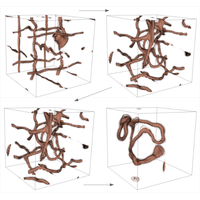Sensitivity of time-dependent density functional theory to initial conditions

Several consecutive frames demonstrating the evolution of a unitary Fermi gas with 12 quantized vortices.
A. Bulgac, I. Abdurrahman, G. Wlazłowski,
Sensitivity of time-dependent density functional theory to initial conditions,
Phys. Rev. C 105, 044601 (2022) [arXiv2108.10858].
In the calculations we used st-wslda-3d+td-wslda-3d to track turbulent dynamics in unitary Fermi gas.
Time-dependent density-functional theory is mathematically formulated through nonlinear coupled time-dependent three-dimensional partial differential equations, and it is natural to expect a strong sensitivity of its solutions to variations of the initial conditions, akin to the butterfly effect ubiquitous in classical dynamics. Since the Schrödinger equation for an interacting many-body system is, however, linear and mathematically the exact equations of the density-functional theory reproduce the corresponding one-body properties, it would follow that the Lyapunov exponents are also vanishing within a density-functional theory framework. Whether for realistic implementations of the time-dependent density-functional theory the question of the absence of the butterfly effect and whether the dynamics provided is indeed a predictable theory was never discussed. At the same time, since the time-dependent density-functional theory is a unique tool allowing us to study the nonequilibrium dynamics of strongly interacting many-fermion systems, the question of predictability of this theoretical framework is of paramount importance. Our analysis, for a number of quantum superfluid many-body systems (unitary Fermi gas, nuclear fission, and heavy-ion collisions) with a classical equivalent number of degrees of freedom O(1010) and larger, suggests that its maximum Lyapunov exponents are negligible for all practical purposes.
